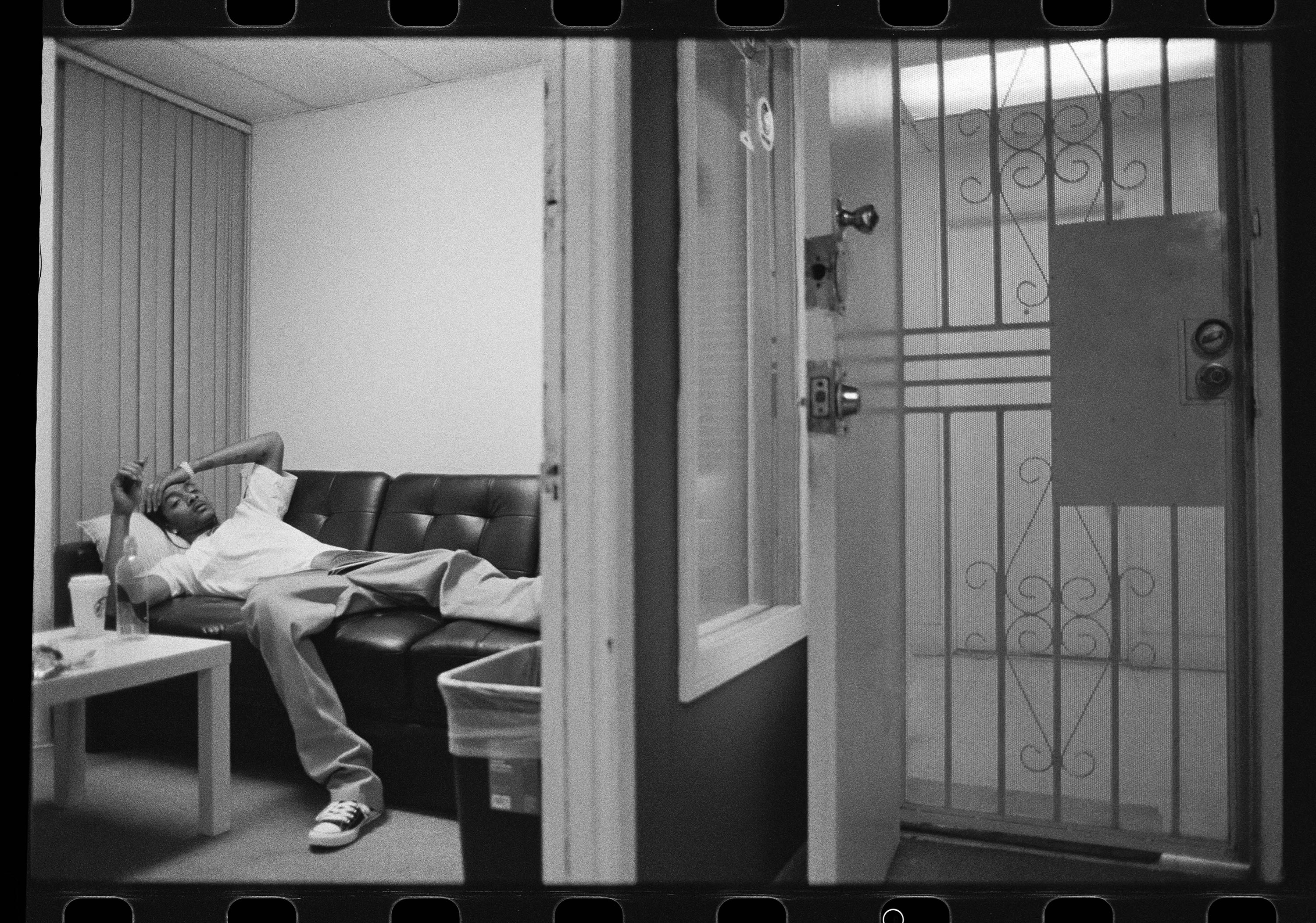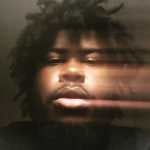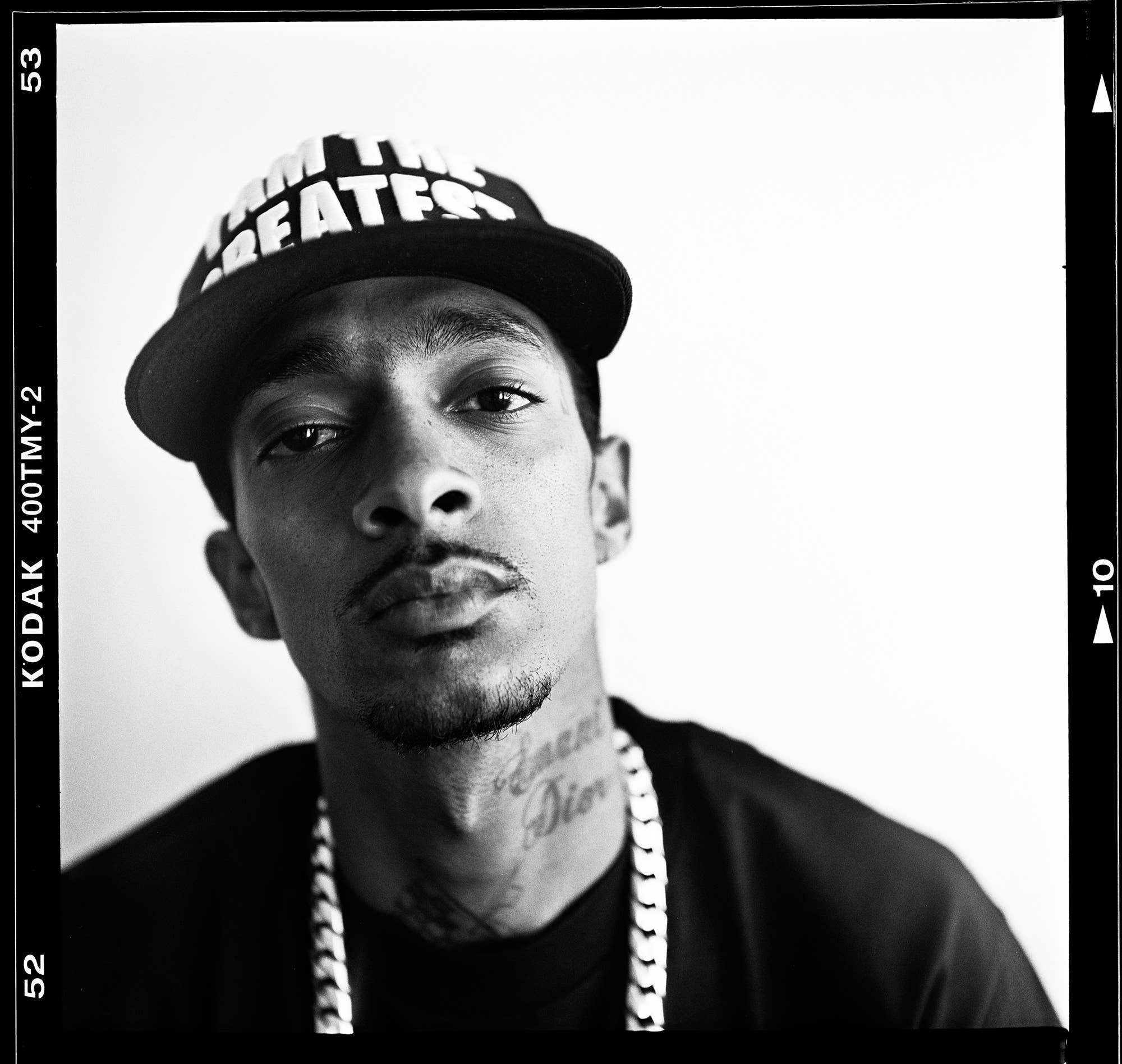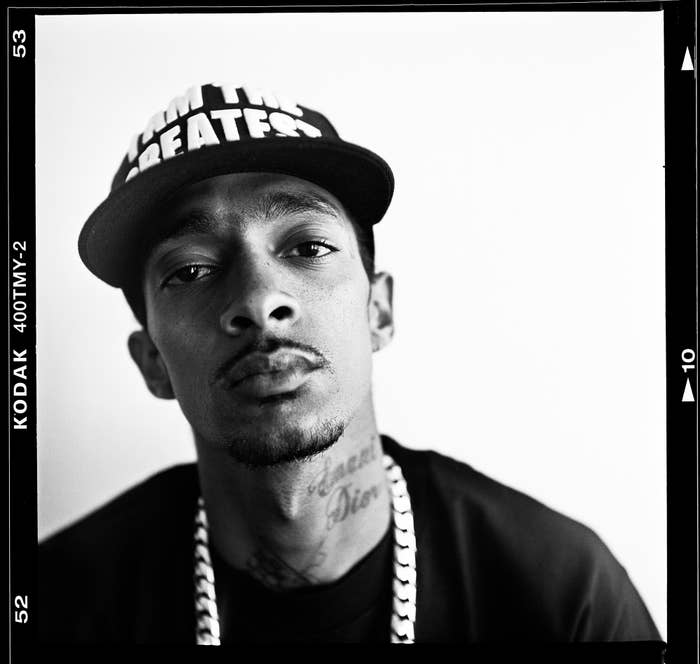
The first time photographer Jorge “JP” Peniche met Nipsey Hussle in person, on the set of the “Hussle in the House” video, he noticed the rapper was already a “hometown hero” in his native Crenshaw neighborhood.
“Every car driving by was playing his music,” Peniche says, remembering the experience of being on Slauson and Crenshaw in 2009. “Someone was on a motorcycle blasting his music out loud. At that point, I’d been in the game for a couple of years, but I had yet to see anything like that.”
JP was already a fan of Nipsey’s Bullets Ain’t Got No Name series, having interacted with him on Myspace and receiving an invite to take photographs in between takes of the video. The area around 3420 West Slauson plaza was full of locals vying for Nipsey’s attention, but the young rapper noticed him first upon arrival.
“He hopped out of a white Bentley, classic All Money In T-shirt with his signature, looking fresh,” JP remembers. “He greeted me in the midst of hundreds of people trying to get his attention at the music video. That’s one thing that anyone who knows Nipsey, [knows he] always went out of his way to acknowledge you. That was really special, especially because it’s the first time we met.”
From there, JP would photograph him “on and off” until Nov. 2010, when Nipsey revealed he was leaving Epic Records and going independent. The rapper also told JP about the next steps he was planning: embarking on The Marathon.
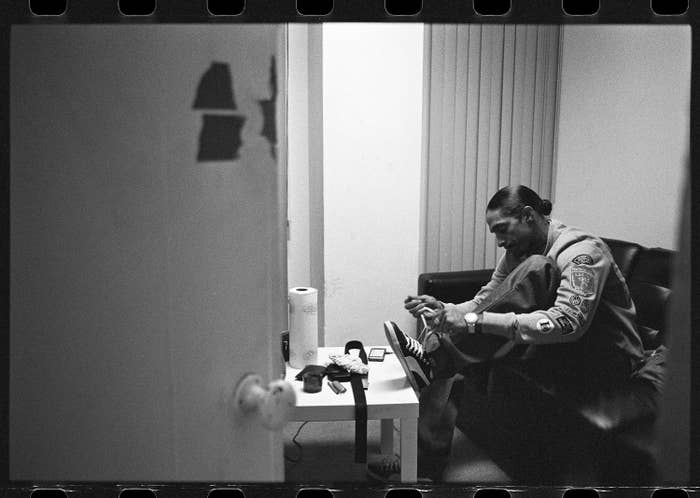
“He said, ‘This is more or less the vision that I have. I want it to be cohesive. I want it to be authentic. I want it to be representative of the lifestyle that I live.’ So he explained to me the concept of The Marathon being a [favorite] phrase since he was young,” JP recalls. “Any time there’d be obstacles thrown in his way, and he was able to bypass the pitfall as a hustler, he would say to his friends, ‘The marathon continues.’ Or if someone were to get caught up and then you bounce back, it was always about the marathon.”
He named his next project The Marathon, and independently released it on Dec. 21, 2010. The 18-track mixtape, which featured Nipsey’s rhymes over industry beats like Fabolous’ “You Be Killin Em” and Currensy and Wiz Khalifa’s “The Planes” (on “7 Days A Week”), as well as original compositions, showcased Nipsey’s candid reflections of who he was in 2010. On motivational project opener “Love,” he surmised, “The fact I’m still standing speaks volumes to my savages.” Later in the tracklist, “Keys 2 The City” is a feel-good affirmation that he’d soon actualize as a son of L.A. The classic “Blue Laces” shows him reflecting on his adverse come-up in South Central, poignantly diagnosing that “the streets is cold, turn innocence to militants.”
“I think The Marathon project specifically was the first seed he planted for this phenomenon that Nipsey was.” – Jorge “JP” Peniche
10 years later, a fresh listen elucidates how much the project set the tone for the rest of his life and career. Fans will get to experience the mixtape in a whole new manner at 9:00 p.m. ET today, Feb. 5, with the release of The Marathon live visual album. The piece, which will air on YouTube Live, was put together by L.A.-based digital agency OkiDoki, who JP knew from a previous collaboration.
“I think OkiDoki knocked it out of the park,” JP says. “I thought it would be pretty cool to create an album visualizer that not only visually showed these different landmarks that were instrumental to this project and to this era, but giving a little bit of background story to these places. The intake of our information and our stories is very intricate and detailed and it was executed to a T.”
The visualizer takes us back to 2010, with viewers following a virtual version of Nipsey’s beloved SL550 Benz as it cruises through L.A., stopping at landmarks like the Watts Towers while The Marathon bumps out of the car speakers (from an iPod). The music is occasionally overlaid with video clips of Nipsey giving game, as well as audio clips from his loved ones and The Marathon collaborators. Longtime Nipsey fans will surely get a rush of nostalgia from the chance to experience the project all over again.
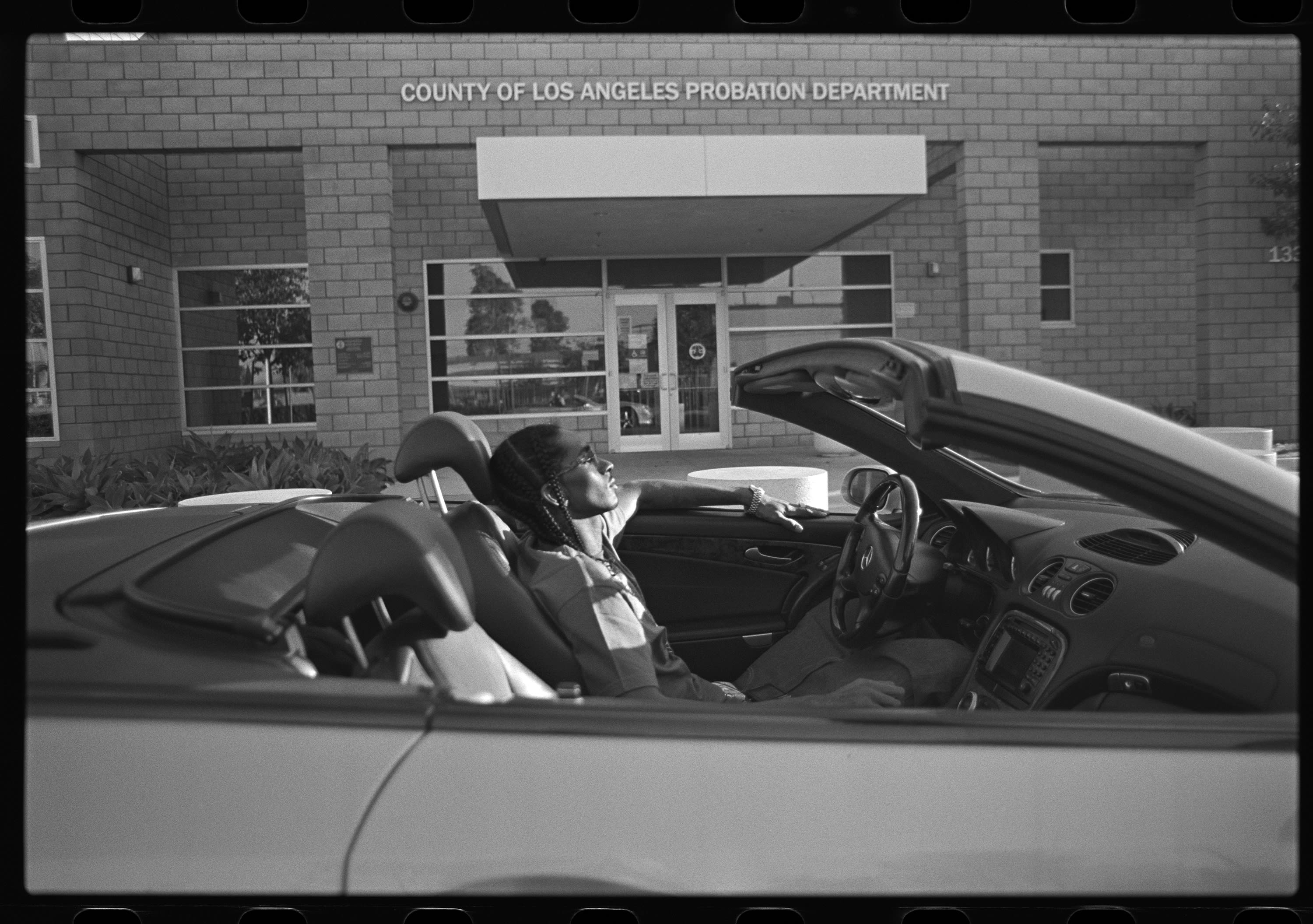
One person with fond memories of 2010 is BIg K.R.I.T., who crafted “One Take 3” on The Marathon. Big K.R.I.T. tells Complex the composition was “an ‘east coast-ish’ beat” he created during his time in Atlanta. Johnny Shipes of Cinematic Music Group first played Nipsey the beat, and K.R.I.T. says the resulting record “excited” him.
“That was a dope thing,” K.R.I.T. recalls. “It wasn’t like I had a name producing at the time. I did my own beats, but I didn’t have a lot of placements. It was a great look for me, so people could see that I was not only serious about producing, but I could go different places with it.”
It’s ironic that “One Take 3” was on a project that displayed all the different places Nipsey could go musically. The Marathon’s 18 tracks explore various moods, but themes of resilience and aspiration permeate the project. On The Marathon, Nipsey had started to imbue his gritty perspective of the L.A. streets with sage-like reflections on his life and purpose.
“One thing that I admired about him, was that the music that he made was just reflective of the life he lived,” JP reflects. “He didn’t stay stuck in the same subject matter, the convenience, the familiarity. He was always pushing himself to express his reality in his own authentic way.”
That intention also spread into the project’s visuals. JP says he initially envisioned a Marathon cover with Nipsey sitting “at the edge of his bed or in a seat [in a hotel room] smoking,” to embody “the hectic travel life of an artist.” Nipsey “helped him reel it back in,” though, and they ultimately decided on the portrait text collage with Nip’s guidance. “Nipsey knew exactly what he wanted,” JP says now.
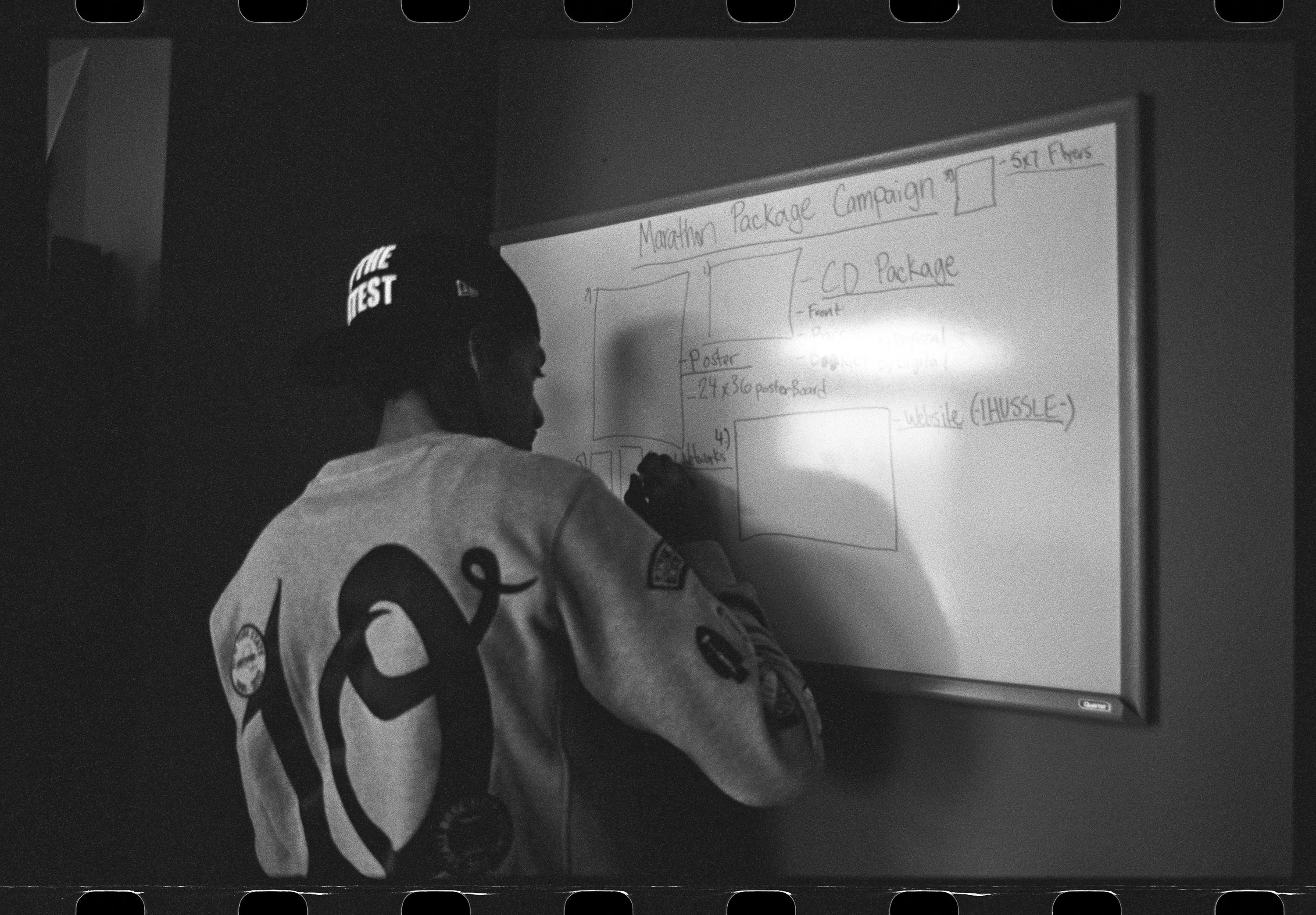
There’s footage on YouTube of Nipsey writing “U Don’t Got A Clue” at 3:00 a.m., working intently as if it was 3:00 p.m. L.A. producer Wizzo created the synth-driven track, and he tells Complex he didn’t realize it got placed on the mixtape until it was released.
“I was just producing in my room for a very long time, just sending out beats to whomever I could get my hands on,” he says. “And one day everybody starts texting me and they’re like, ‘Yo, you’re on that new Nip.’” Wizzo says he checked online to confirm, then Twitter DMed Nipsey, who asked him to come to the studio.
The two became close, and Wizzo frequently pulled up to the studio to play beats and smoke with Nipsey (“I don’t think anybody rolls better than me,” he jokes). An engineer as well as producer, Wizzo demonstrated his technical expertise through their conversations, and Nipsey asked him to be his engineer. Misfortune came when Wizzo got put on house arrest just a week later, but he eventually bounced back and returned to the studio, serving as engineer and executive producer on The Marathon Continues, TMC: X-Tra Laps, Crenshaw, and Mailbox Money.
It’s not like Nipsey had to have someone record him, though. As Wizzo points out, “All of The Marathon was Nipsey recording himself. Pretty much 90% of it,” he says. ”I can tell, because when I would go back and check out the Pro Tools sessions of some of the tracks, you can always hear the squeaky sound, which is the door to the studio. You could hear [makes door creaking sound] and then he goes in and he closes it and he goes, ‘Yeah.’ And he finishes, and he goes [makes creaking sound].”
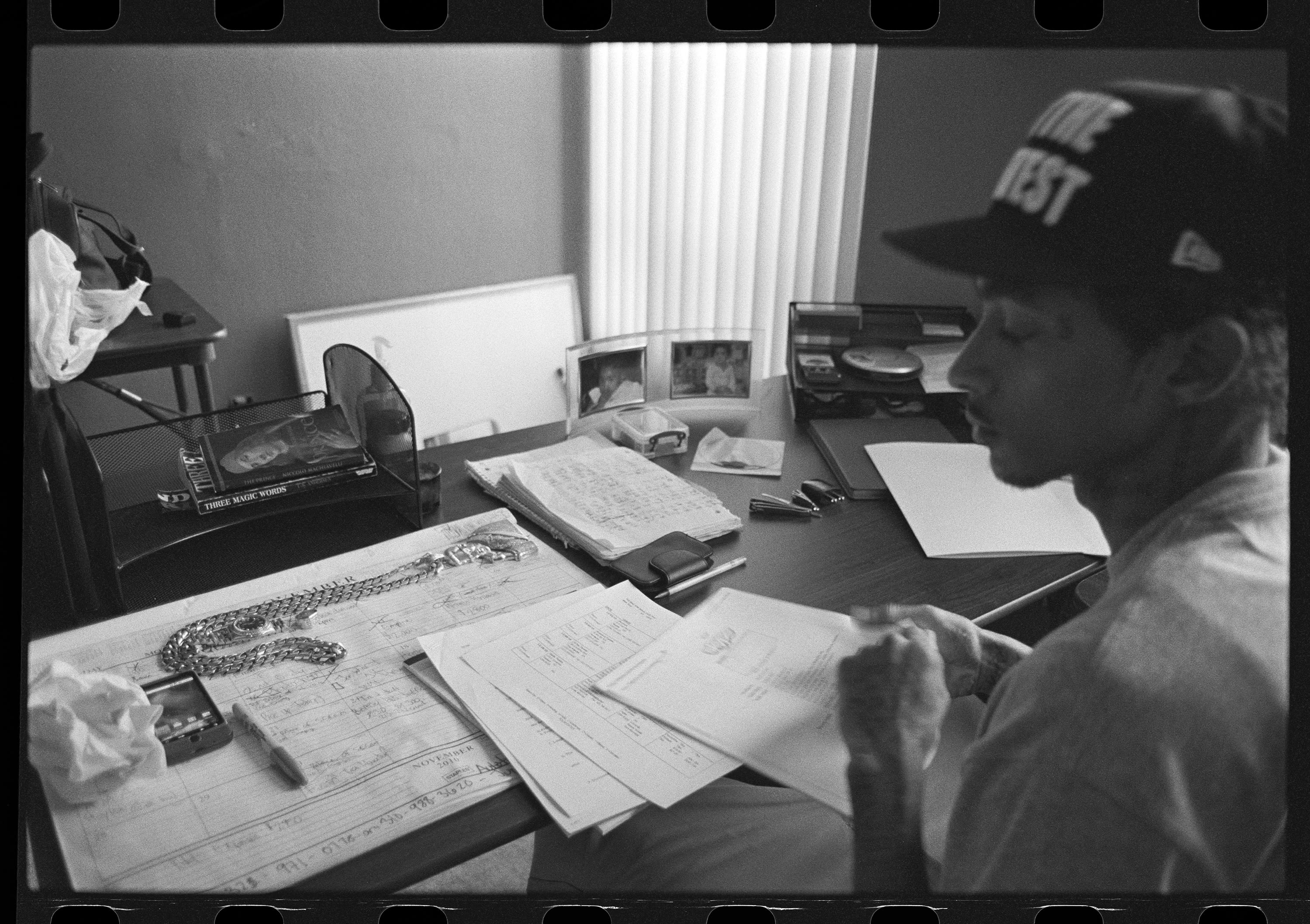
Nipsey was taking independence as literally as he could. JP says the rapper was even cleaning the studio himself at times, setting a tone that he expected those on the rest of the team to follow.
“Our team wasn’t built of people that would pass the buck because it was a job too small, or if there was a job that they felt that was beneath them,” JP says. ”Everyone on our team understood that if something was thrown on our desk, we had to knock it out. And Nipsey was the same. The guy would go through his own contract making sure that he was thorough, and that he was doing what he was supposed to do.”
The Marathon did what it was supposed to do, elevating Nipsey’s visibility as the first step on his journey as an independent artist. He also inspired his listeners. Wizzo recalls Nipsey showing him emails of The Marathon fans saying, “I’m a better father. I’m a better businessman. I’m a better person. I believe in myself. Thank you for inspiration.”
“For me, his legacy is understanding a catalog and your worth, being independent, and [being] so sure of yourself that even when people aren’t as cool you’re gonna keep it movin.” – Big K.R.I.T.
As Nipsey’s brother Samiel “Blacc Sam” Asghedom told Complex, Nipsey felt obligated to pay that success forward. “For him, this neighborhood was everything,” he said. “This was where he grew up at. People seen him grow, learn, change, open business. So it was never about leaving. For him, how could he not stick around to show the other kids they could do the same thing?”
For some artists, their M.O. is leaving their area and serving as a beacon of possibility from afar. And while that can be inspirational to some, it can also feel unattainable to those mired in poverty. Those around Nipsey say that he didn’t have that mindset.
“As a youngster, he never respected people who made it and left,” Sam said in 2019. “So obviously, when success and opportunity came, he was gonna have to bring it back and invest in the area and inspire the kids, just like when he was young.”
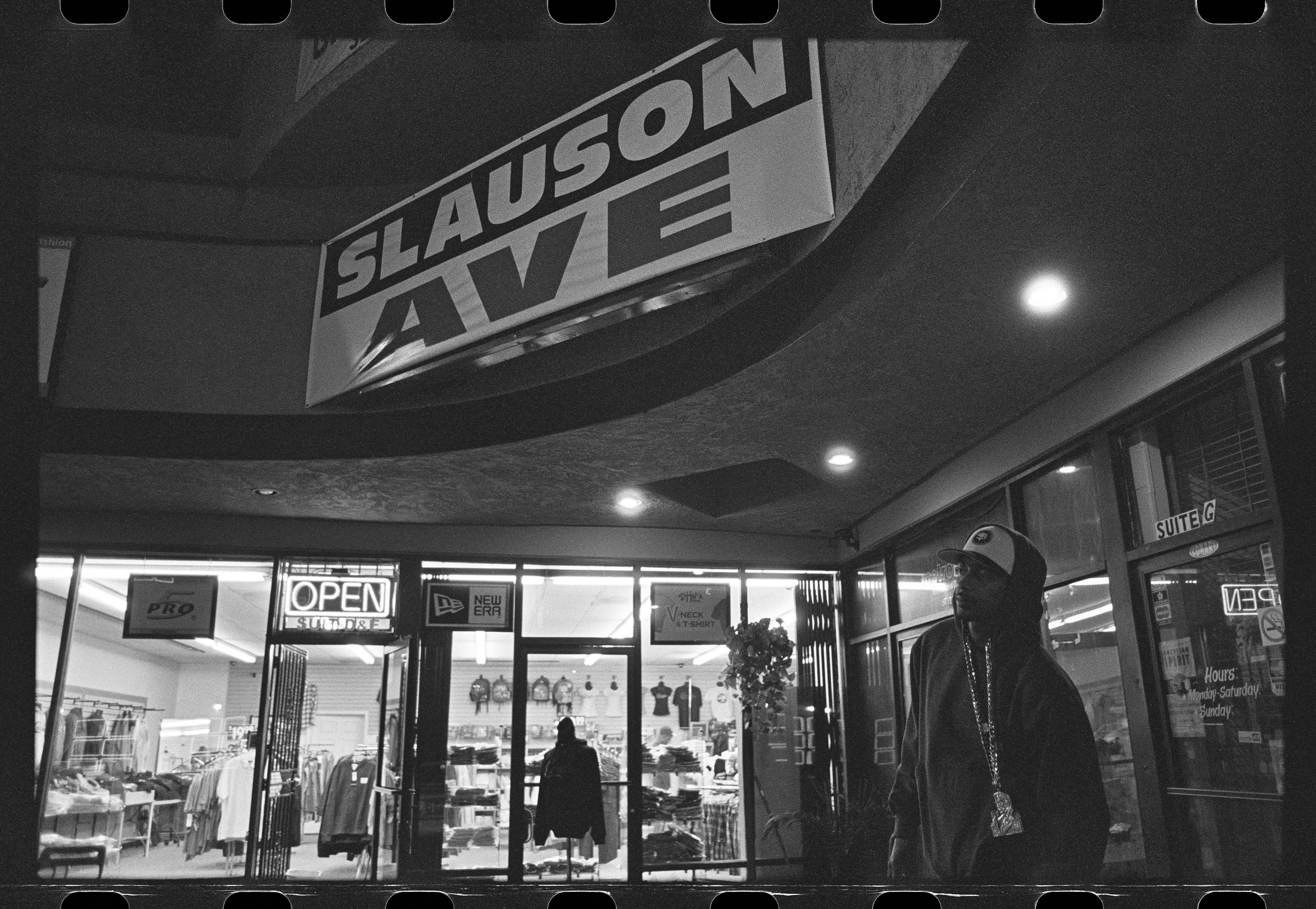
That’s just what he did, laying the groundwork for the endeavors still helping his community to this day. His Marathon Clothing store started as a hand-to-hand operation outside of the establishment he eventually purchased in 2017. The next year, he announced Vector 90, a co-working space he started with business partner David Gross. The “cultural hub and incubator” also helps educate budding entrepreneurs like he once was. Gross told Complex in 2019 that he knew Nip was the man for the job: “When I was conceptualizing Vector90, I knew I’d need a partner from the neighborhood: someone who was closely connected to it, who was authentic, who the community would embrace and trust. So there was no decision-making process. It was a given to try to work with him.”
Some of Nipsey’s community efforts came to full fruition around the release of his 2018 Victory Lap album, which was also a reference to him signing with Atlantic Records on his own terms after serving as the independent blueprint. But Wizzo says they were working on Victory Lap as early as 2014, and Nipsey had been building toward these community initiatives all his life. His entrepreneurial moves garnered much-deserved headlines, but it was his quiet work in the early 2010s, on what JP called “the road less traveled,” that laid the groundwork. His timeline epitomizes The Marathon vision he laid out to JP on that day in 2010, a testament to his self-dependence and determination.
“His mission in life was really clear from an early age, and that was to inspire and to help people. He loved people. He loved his community.” – Jorge “JP” Peniche
“I think The Marathon project specifically was the first seed he planted for this phenomenon that Nipsey was,” JP reflects. “Nipsey was very intentional with all of the music that he did, and all the moves that he did. His mission in life was really clear from an early age, and that was to inspire and to help people. He loved people. He loved his community. If Nipsey didn’t do music, I think he would still inspire in some other capacity. He was a natural-born leader.”
JP was with Nipsey virtually every day for a five-year period as his personal photographer, before becoming his road manager in 2015. He says his most indelible memories with Nip are riding with him in his convertible SL550 Benz, which he says was his “place of refuge.”
“If Nipsey wasn’t in the studio with his family, in a meeting, or reading a book, [he] definitely was in his car just pulling up to different destinations that inspired him,” JP says.
Now those same streets he roamed are full of Marathon murals and people with “Prolific” tattoos, reflecting just how impactful his music and messaging still is.

Big K.R.I.T., who credits Nipsey with giving him game in 2010 when they first met (and K.R.I.T. was “green” to the industry), says that Nipsey’s musical legacy is about “understanding a catalog and your worth, being independent, and [being] so sure of yourself that even when people aren’t as cool you’re gonna keep it movin.” He adds that his interpretation for the meaning of The Marathon Continues is, “In life, you can’t slow down because people ain’t in your corner or don’t understand what you got goin’ on.”’
JP and Wizzo—two men who share Nipsey’s independent, entrepreneurial spirit, and were close to him during that period—point out that he not only positively impacted the music industry, but society in general.
“I think his community work was definitely a catalyst for a lot of artists to start reinvesting in their communities,” JP reflected. “I know Nipsey took a lot of pride in doing that type of work because he felt that his community deserved it. With Nipsey, starting up that relationship with Dave Gross and starting the community center with Vector 90, I think that was a seed planted that is starting to blossom. You see them working with Derrick Rose in Chicago, T.I. in Atlanta, and Trae Tha Truth in Houston. I’m sure there are other people that will spring up because people were so inspired by what Nipsey did in his own backyard.”
“Nip taught people that they can do it,” says Wizzo, who has been re-listening to The Marathon a lot during the pandemic, “You can be from a place where people don’t even have a chance to do anything, right? You can be from that and have a very dark path, and you can come out upfront and be not only a model citizen to your community but to people in general.”
